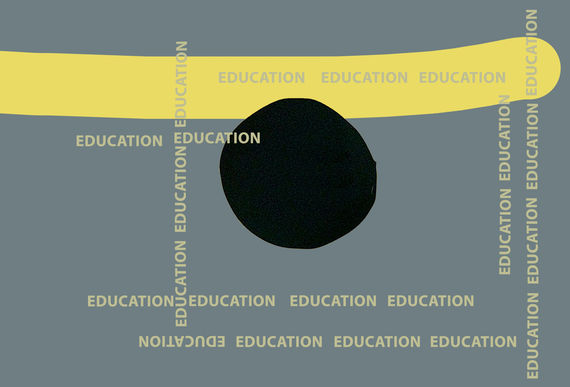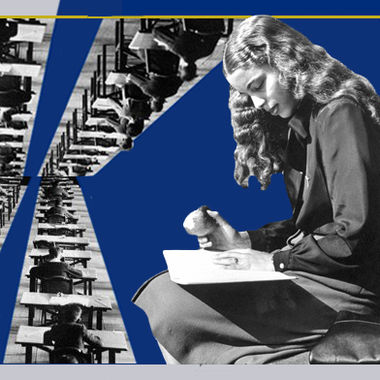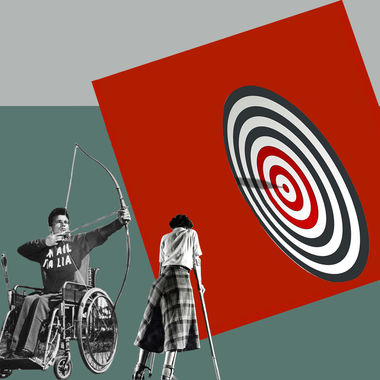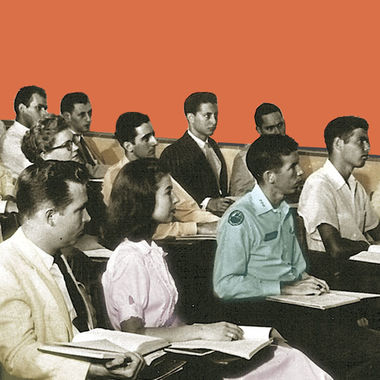Sun Jun 09 2019 · 7 min read
From Isolation to Inclusion: Children With Special Needs and Their Right to Education

By Lusine Sargsyan

In recent years, “Education for All” has become one of the most widely circulated phrases while referring to the current educational system in Armenia. For a country which was under Soviet rule for seven decades, where having a disability often meant social isolation and living with a culture of stigma, the introduction of a nationwide inclusive education model was a remarkable step forward. While the existence of people with disabilities was rejected several decades ago, today, children regardless of their intellectual, physical, emotional, or linguistic conditions will attend mainstream schools by 2025.
Since the ratification of the UN Convention on the Rights of the Child (1990), and the adoption in Armenia of the Law on the Child’s Rights (1996), international organizations began promoting inclusive education in Armenia. In 2005, the Law on Education of Children with Special Needs was adopted, which was a critical step towards the creation of a more inclusive environment. During the initial stage, the Ministry of Education mandated specific schools to accept children with special needs and create the necessary conditions for their inclusion. However, in 2014, amendments to the Law on Education and the Law on Mainstream Education were amended which stipulated that by August 1, 2025 the entire Armenian educational system would become fully inclusive. By March 1, 2017, there were 291 inclusive schools in Armenia.
Following these amendments every mainstream school was and is obligated to provide additional resources to fully integrate students with special educational needs (SEN). But despite all the laws and initiatives, which emphasize the consensus on the need to have more inclusive schools, a 2017 report by Human Rights Watch found that the rights of children with disabilities in state-run residential institutions were still being violated. Thus, Armenia faces serious challenges while implementing the policies of inclusive education. The report also states that although approximately 6,700 students with SEN were registered in inclusive mainstream schools for the 2016-2017 academic year (this, according to the Ministry of Education and Science), the quality of education was below international standards and an individualized approach was often lacking.
Inclusive educational institutions have multidisciplinary teams on staff and are recruited based on students’ needs. The Government decree on the composition of the faculty of mainstream schools states that the multidisciplinary team can be composed of a psychologist, special education teacher, speech therapist and sign language teacher. Also, starting from September 2018, the teacher’s assistant position was introduced in inclusive mainstream schools. According to the Ministry of Finance, the annual budget allocation per child without special educational needs studying in a mainstream school is 100,000 drams ($207 US), while the funding for a child with SEN amounts to approximately 600,000 drams ($1250 US) per year.
Following the adoption of the Law on Education of Children with Special Needs, the standard diagnostic tool of International Classification of Diseases (ICD) was replaced in Armenia with International Classification of Functioning, Disability, and Health (ICF). As a result, the needs assessment which previously was provided based on the medical model now focuses on the functionality of the child and the ability to perform various activities. Another important development is that the needs assessment for inclusive education has changed and since September of 2018 is implemented through three stages, which guarantees more transparency and accountability. Those stages include an initial evaluation, which is conducted at the school and by teachers; the secondary assessment is conducted by pedagogical and psychological support centers, and the final evaluation, which is not mandatory, is conducted by the Republican Multidisciplinary Assessment Center, only if the results provided by the previous two stages are in conflict.
Susanna Sahakyan, who is a special education teacher at Johannes Lepsius School N88 highlighted the need for strict monitoring to guarantee that both the initial and secondary assessments are based on objective criteria and that inclusion is not used as an instrument to secure and then maintain additional funding from the Government. For example, within a short period of time, schools in the marz of Shirak registered high number of students identified with SEN, the majority of whom had emotional and behavioral disorders. The contrast was striking with schools, which despite being pioneers of inclusive education in Armenia, had significantly fewer number of students with SEN. Following this revelation, the government adopted a radical approach and decided to decrease the amount of funding directed to schools as a whole, and starting from September 2018, the emotional and behavioral criteria was excluded from the assessment to avoid its artificial application. By trying to eradicate corrupt practices, this move by the government could potentially hinder the quality of education for children who do actually suffer from emotional or behavioral problems.
Regarding the availability of physical facilities of schools and their staff’s ability to adjust to the needs of each student, Sahakyan stressed that currently no school in Armenia is fully equipped with the necessary facilities and instructional materials. She added that indifference and not the lack of facilities is a major impediment to inclusive education. The absence of the latter can be explained by the fact that the majority of schools were built during the Soviet era when the existence of people with disabilities was denied, thus physical adjustment of any building was not even considered. According to the amendments to the law on Education of Children with Special Needs, the schools that are being constructed now have to consider equality and accessibility. Sahakyan believes that the willingness of the school administration to create the necessary learning environment for each child and determination to come up with alternative solutions are key factors.
Sahakyan believes that attitudes by parents of both abled students and those with disabilities are beginning to change. She said that the only request of parents in the last several years has been to ensure that the needs of each and every child are met. While prejudices against people with disabilities are deeply entrenched “the progress and open-mindedness that are evident in the new generation is truly uplifting,” she says.
The current curriculum at pedagogical institutions exposes students to the idea of inclusive education. This is a step forward compared to the Soviet era when defectology (the science of handicapped children that was practiced in the Soviet Union) was an integral part of the curriculum. However, proper assessment of the instructors and professors at these institutions has not been carried out and prejudicial perceptions of teachers towards students with disabilities or special needs is still a common practice.
Even with the slow shift in mentality and training offered to teachers, this is still not enough to change mindsets. This, coupled with the fact that schools are not equipped with the necessary facilities or materials to implement methodology, compounds the problem further.
Sahakyan recalled that during the first year following the transformation of her school to an inclusive one, the attitude of teachers towards the closure of special schools was negative and expressions such as “additional burden,” and “waste of time” were a common attitude. This, once again, is a remnant of the Soviet legacy Sahakyan believes. Teachers are resistant to the new practice which requires them to design individual plans for each child identified with SEN.
It is important to note that the lack of quality control contributes to the persistent gap between the scenario portrayed in documents and the reality. Having an inclusive educational system should, of course, be prioritized, since it will guarantee the right of every child to have access to education, but it should not be at the expense of the quality of education. There have been cases when parents who have children with disabilities have felt compelled to leave the country simply because they did not believe that their child would have a decent future in Armenia.
Homeschooling for children with special needs is another aspect of education which is not adequately regulated and often is abused by parents who are reluctant to take their child to school predominantly because of the lack of financial resources, as well as by schools which do not consistently monitor the implementation of the practice. The law stipulates that homeschooling should be permitted only if a child suffers from a severe disability, while in the remaining cases the school administration has to invest all the efforts to integrate every child in the learning environment.
The Education Officer at UNICEF, Maya Simonyan, believes that besides inclusive schools the role of inclusive kindergartens should be prioritized since they play a crucial role in a child’s overall development and prepare for the transition period. According to Simonyan, prior research indicates that during the first five years of life a child with or without SEN is rapidly developing. Thus, if the intervention of specialists begins at an early stage, the outcomes would be evident even earlier.
related
The Challenges of National Educational Assessments in Armenia
By Hayk Daveyan
While Armenia has participated in several international comparative educational assessments, and has designed national assessment tools, neither have been implemented properly. Today, more than ever, there is a great need to properly analyze existing data that can inform educational policy making and curriculum development.
Chairs…They See No Status
By Misha Tadevosyan
Education is an inalienable right, regardless of circumstances. Juveniles deprived of liberty in Armenia face challenges that include issues with rehabilitation and reintegration, but also with the right to education.
Sex Education, Stereotypes and Disabilities
By Kushane Chobanyan
Sex continues to be a taboo subject in Armenia. When it comes to sexual relations between individuals with disabilities, the misconceptions and taboos are even greater, writes Kushane Chobanyan.
How to Transform High-Tech Education in Armenia
By Artashes Vardanyan
Education has the immense power to impact industries and the economy. Artashes Vardanyan writes about the need to transform the educational system to meet the needs of one particularly promising sector of Armenia's economy, the High-Tech industry.
Independence Generation: Education, Societal Aspirations and Implications for Development
By Narek Manukyan
This commentary by Narek Manukyan touches upon some of the key findings about education in a study commissioned by the Friedrich-Ebert-Stiftung called, "Independence Generation - Youth Study 2016." It takes an in-depth look at societal aspirations and how they impact youth within the context of education.







